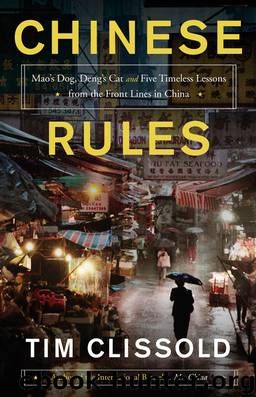Chinese Rules by Tim Clissold

Author:Tim Clissold
Language: eng
Format: epub
Publisher: HarperCollins
10
THE THIRD CHINESE RULE:
The Art of War Is of Vital Importance for the State; It Is a Matter of Life and Death; the Road to Safety or Ruin That Should on No Account Be Neglected.
—Opening lines of Sunzi’s The Art of War, c. sixth century BC
The Taiping Rebellion dealt such a blow to Qing finances that the dynasty never recovered. As the emperor flailed his impotent officials with edicts from the Forbidden City, the foreigners pressed inland regardless. British traders marched up the Yangtse. In the south, the French took the mountains of Yunnan and the Germans occupied the northern peninsula of Shandong, where Confucius is buried. In 1894, Japanese forces obliterated China’s navy in a short, bloody war and China began to fragment. It seemed as if the empire faced the equivalent of the most grotesque of all imperial punishments—the ling chi, or “death by slow slicing and dismemberment.”
As turmoil swirled along the coast, deep within the countryside the lives of millions of peasant farmers still beat to the timeless rhythms of Chinese rural existence. In 1893, three decades after Hong Xiuquan died, along with his dreams of a Heavenly Kingdom, Mao Zedong was born in a country village hidden among the rolling hills of the southern province of Hunan. Eighty-three years later, as he lay dying near the Forbidden City in an ornamental pavilion called the “Library of Chrysanthemum Fragrance,” Mao had taken his place among the handful of peasant emperors who, during China’s long cycles of history, rose up from the rubble of a collapsing dynasty and—by brute force and willpower—founded the next.
Throughout his long life, Mao never lost the earthy habits of his Chinese peasant ancestry; his teeth were almost black since he never bothered to brush them and he once famously startled a foreign journalist by absentmindedly pulling down his trousers “to search for some uninvited guests.” Even when he was Chairman of the People’s Republic, a guard used to follow him out of his quarters into the grounds with a shovel until Zhou Enlai, the prime minister, ordered a squat-down latrine to be built next to Mao’s bedroom. But whatever his personal habits may have been, in his final years Mao’s authority was absolute; he had dominated China for three decades and when he died in 1976, a power as lethal, unrestrained, and arbitrary as that of the emperors in the olden times died with him, perhaps forever.
The pale ocher mud-daubed walls of Mao’s sprawling family home still stand next to a lotus pond in the little village of Shaoshan. It sits in a narrow valley with terraced rice fields and pine woods, and nowadays there’s a busy restaurant on the other side of the pond. Inside, a huge black-and-white photograph of a girl perched on the Chairman’s knee covers the back wall. By the time I visited the village, the girl was well into her eighties, but she was still milking her association with the Chairman for all it was worth.
Mao’s father was a small landowner and held mortgages on some fields around Shaoshan.
Download
This site does not store any files on its server. We only index and link to content provided by other sites. Please contact the content providers to delete copyright contents if any and email us, we'll remove relevant links or contents immediately.
| China | India & South Asia |
| Japan |
Fanny Burney by Claire Harman(26603)
Empire of the Sikhs by Patwant Singh(23086)
Out of India by Michael Foss(16853)
Leonardo da Vinci by Walter Isaacson(13336)
Small Great Things by Jodi Picoult(7143)
The Six Wives Of Henry VIII (WOMEN IN HISTORY) by Fraser Antonia(5515)
The Wind in My Hair by Masih Alinejad(5095)
A Higher Loyalty: Truth, Lies, and Leadership by James Comey(4964)
The Crown by Robert Lacey(4817)
The Lonely City by Olivia Laing(4802)
Millionaire: The Philanderer, Gambler, and Duelist Who Invented Modern Finance by Janet Gleeson(4478)
The Iron Duke by The Iron Duke(4356)
Papillon (English) by Henri Charrière(4274)
Sticky Fingers by Joe Hagan(4199)
Joan of Arc by Mary Gordon(4110)
Alive: The Story of the Andes Survivors by Piers Paul Read(4033)
Stalin by Stephen Kotkin(3966)
Aleister Crowley: The Biography by Tobias Churton(3640)
Ants Among Elephants by Sujatha Gidla(3467)
